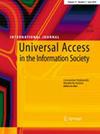An AI-based English education platform during the COVID-19 pandemic
IF 2.7
4区 计算机科学
Q3 COMPUTER SCIENCE, CYBERNETICS
引用次数: 0
Abstract
Abstract This study examines whether the use of AI-Pengtalk, an AI-based Conversational English programme, provided by a broadcasting company (EBS) that specializes in public education can significantly improve conversational English skills and bridge the English language proficiency gap associated with parental socioeconomic status. Over the course of four weeks from April 27 to May 22 in 2020, 108 fourth-grade classes in 54 elementary schools voluntarily participated in this experiment. Two classes in each school were designated as a treatment group and a control group. For the treatment group, a tablet installed with a pilot version of AI-Pengtalk was provided and students were encouraged to make use of the programme. Two sets of surveys and English tests were placed pre and post hoc. After 4 weeks, test scores, log files, and survey responses of participants were analysed. A series of DID analyses demonstrate that the use of AI-Pengtalk improves the treatment group’s self-evaluation of their English abilities, confidence in using English, preference on English itself, and amount of time spent on studying English during the pilot experimental period compared to the control group. When other variables were controlled, the use of AI-Pengtalk also helped the treatment group achieve higher test scores. This study implicates that the use of smart English education like AI-Pengtalk may especially be able to better compensate for academic setbacks caused by low parental SES or, in the case of English learning, the reluctance to converse in English with other students.新冠疫情期间基于人工智能的英语教育平台
摘要本研究考察了一家专门从事公共教育的广播公司(EBS)提供的基于人工智能的英语会话节目AI-Pengtalk的使用是否能显著提高英语会话技能,并弥合与父母社会经济地位相关的英语能力差距。在2020年4月27日至5月22日的四周时间里,54所小学的108个四年级班级自愿参加了这项实验。每所学校的两个班级被指定为治疗组和对照组。治疗组获得了安装AI-Pengtalk试用版的平板电脑,并鼓励学生使用该程序。课前和课后分别进行了两组调查和英语测试。4周后,对参与者的测试成绩、日志文件和调查反应进行分析。一系列DID分析表明,与对照组相比,AI-Pengtalk的使用提高了试验组对英语能力的自我评价、使用英语的信心、对英语本身的偏好以及在试验期间学习英语的时间。当其他变量得到控制时,AI-Pengtalk的使用也帮助治疗组取得了更高的考试成绩。这项研究表明,使用像AI-Pengtalk这样的智能英语教育可能尤其能够更好地弥补由于父母经济地位低而导致的学业挫折,或者在英语学习的情况下,不愿与其他学生用英语交谈。
本文章由计算机程序翻译,如有差异,请以英文原文为准。
求助全文
约1分钟内获得全文
求助全文
来源期刊

Universal Access in the Information Society
COMPUTER SCIENCE, CYBERNETICS-
CiteScore
6.10
自引率
16.70%
发文量
81
审稿时长
>12 weeks
期刊介绍:
Universal Access in the Information Society (UAIS) is an international, interdisciplinary refereed journal that solicits original research contributions addressing the accessibility, usability, and, ultimately, acceptability of Information Society Technologies by anyone, anywhere, at anytime, and through any media and device. Universal access refers to the conscious and systematic effort to proactively apply principles, methods and tools of universal design order to develop Information Society Technologies that are accessible and usable by all citizens, including the very young and the elderly and people with different types of disabilities, thus avoiding the need for a posteriori adaptations or specialized design. The journal''s unique focus is on theoretical, methodological, and empirical research, of both technological and non-technological nature, that addresses equitable access and active participation of potentially all citizens in the information society.
 求助内容:
求助内容: 应助结果提醒方式:
应助结果提醒方式:


